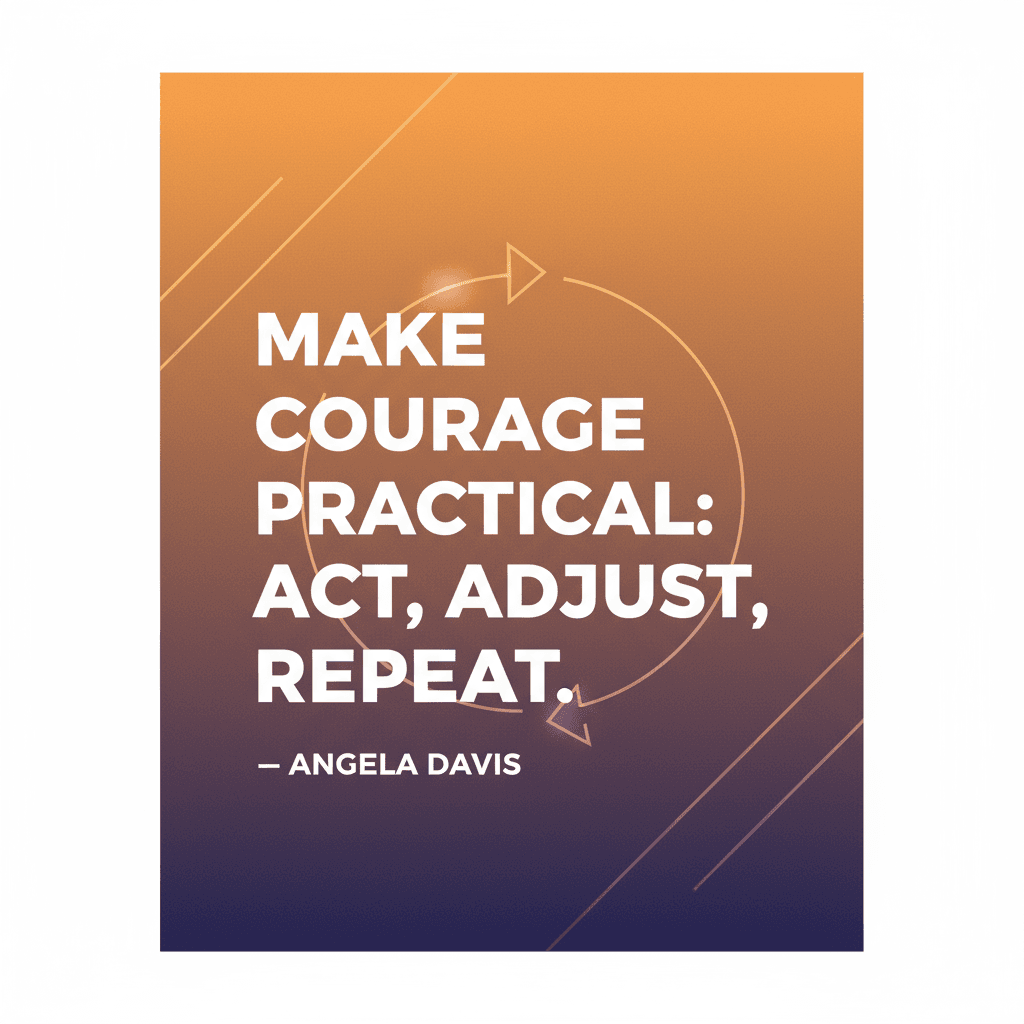Courage as Iteration: Act, Adjust, Repeat in Practice

Make courage practical: act, adjust, repeat — Angela Davis
From Inspiration to Praxis
Angela Davis’s call makes courage tangible: not a mood, but a loop of doing, learning, and trying again. Rather than waiting for certainty, it urges a bias toward action that is refined by reflection. This is the spirit of praxis—where ideas are tested against reality and revised for impact. Paulo Freire’s Pedagogy of the Oppressed (1970) describes praxis as reflection and action upon the world to transform it, a rhythm echoed in Davis’s organizing across decades. By recasting bravery as a practical cycle, the slogan rescues courage from abstraction and places it squarely in our calendars and communities.
Iteration as a Method, Not a Mood
Act, adjust, repeat functions like a method of inquiry. John Dewey framed problem-solving as experimentation guided by consequences (Logic: The Theory of Inquiry, 1938), while the Shewhart–Deming cycle—plan, do, check, act—popularized continual improvement in industry. Likewise, the Agile Manifesto (2001) favored frequent feedback over grand plans. In all cases, progress is not perfection at first attempt; it is iteration with intention. Thus, courage becomes measurable: try a tactic, solicit feedback, decide what to keep, and proceed with a better version. The process transforms fear of failure into fuel for learning.
Movements That Learned in Motion
Historically, justice movements advanced by adapting under pressure. During the Montgomery Bus Boycott (1955–56), organizers adjusted carpools, fundraising, and legal strategies as segregationists countered them (Taylor Branch, Parting the Waters, 1988). After brutal attacks on the Freedom Riders in 1961, CORE and SNCC recalibrated routes and protections, ultimately forcing federal enforcement of desegregation. Each pivot came from disciplined review, not improvisation alone. The lesson is consistent: strategic courage thrives where experience is harvested, shared, and redeployed, turning setbacks into design input for the next action.
Angela Davis’s Iterative Abolitionism
Davis’s own trajectory models iterative courage. The global defense campaign surrounding her incarceration (1970–72) continually adjusted legal arguments and public messaging as conditions shifted—documented in Shola Lynch’s film, Free Angela and All Political Prisoners (2012). Later, her abolitionist scholarship invited evolving strategies aimed at shrinking the carceral state, from challenging policing to building community-based safety (Are Prisons Obsolete?, 2003). Freedom Is a Constant Struggle (2016) extends this by linking movements from Ferguson to Palestine, showing that courage grows when local lessons inform transnational tactics. Each phase builds upon the last, refining both means and ends.
The Psychology of Small, Brave Steps
Psychologically, action breaks fear’s spell. Behavioral activation research shows that doing—then noticing results—can reduce paralysis and build momentum; mastery experiences strengthen self-efficacy (Albert Bandura, 1977). Crucially, adjustments keep actions within a tolerable stretch zone: ambitious enough to matter, modest enough to repeat. In this way, courage is not the absence of fear but the willingness to test slightly bolder versions of ourselves, one iteration at a time.
Feedback, Accountability, and Values
To keep adjustment principled, movements use feedback rituals. After Action Reviews, widely used in organizations and community campaigns, ask: What did we intend? What happened? Why? What will we change? Ella Baker’s insistence on listening-centered leadership ensured that such learning flowed upward from the grassroots. This guards against drift, since iterative zeal can otherwise slide into expediency. As Audre Lorde reminded activists in 1979, methods shape outcomes; the master’s tools cannot rebuild a just house. Ethical guardrails make repetition not just efficient, but liberating.
A Playbook for Everyday Courage
Finally, iteration scales from movements to daily life. Choose a specific arena—workplace equity, a neighborhood project, or a creative risk—and define a small experiment with a clear timebox. Act, then gather feedback from those affected. Adjust scope, language, or partners, and try again. During the early pandemic, many mutual aid groups shifted from pop-up pantries to delivery after hearing from elders and disabled neighbors, refining routes and safety protocols week by week (Dean Spade, Mutual Aid, 2020). The pattern holds: courage is a cycle you can schedule—one that compounds into change.